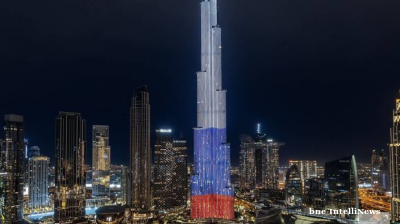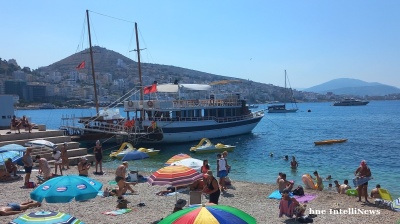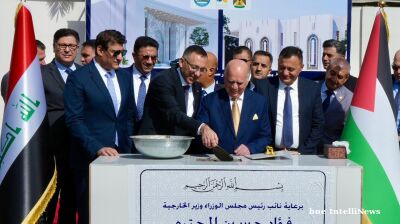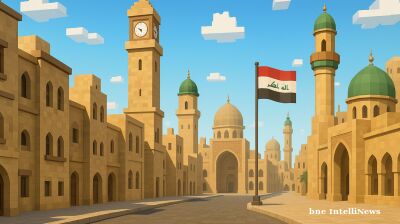On a balmy evening in Iraq’s Mosul, Amira Taha, dressed in dark blue, dines with friends and their daughters at a recently opened restaurant. The air is filled with the melodies of Iraqi and Arabic songs, a stark contrast to the oppressive silence that blanketed the city just a few years ago.
"Everything has changed in Mosul," says Taha, a 35-year-old housewife. "There's freedom, safety and independence now. Evening outings have become common."
Seven years after Iraqi authorities declared "victory" over the Islamic State (IS) group, which controlled vast swathes of northern and western Iraq between 2014 and 2017, Mosul's streets, parks and restaurants are teeming with families savouring their first taste of security and liberty in years.
Taha, who says she goes out daily for entertainment, says that she no longer "feels afraid at all." The local residents, she notes, "are now enjoying freedom without restrictions," a far cry from the days under jihadist control when they were confined to their homes, doors locked, al Mashhad wrote.
From Destruction to Reconstruction
The city's recovery has been a long and arduous process. Many neighbourhoods were reduced to rubble, necessitating extensive demining operations before rebuilding homes, roads, and infrastructure could begin, paving the way for the return of displaced residents. Today, Mosul is home to 1.5mn people.
Like Mosul, several Iraqi cities are experiencing relative stability after decades of wars, political conflicts, sectarian violence, kidnappings and terrorist attacks that have burdened Iraqis in their daily lives.
Across from the historic Qara Saray Palace and Bashtabia Castle, the "Chef Ahmed Al-Sweidi" restaurant, which opened in June, buzzes with 300 to 400 patrons daily, according to its founder.
During an outdoor evening event featuring local singers and a band, children clap and dance while some adults smoke shisha, and others enjoy Western dishes, some Scandinavian and European, infused with Iraqi Mosul flavours by the chef.
The restaurant's 40-year-old owner, dressed in a white chef's uniform, says: "Before the events, I left the city and lived more than half my life in Sweden, but I always dreamed of returning to open my own project in Iraq."
Al-Sweidi, who has adopted the moniker "The Swede" from his time in Stockholm, adds: "I wanted to bring a new idea to Nineveh governorate, so I returned."
"It's impossible for me to go back to living abroad... after returning with my two daughters and wife to continue our life here," he continues, expressing satisfaction that "people have started wanting to go out to see new and different things."
A new lease on life
Just a few metres away in the Forests area, long a popular destination for Iraqis from Nineveh and other governorates before the conflict, families frequent a tourist complex comprising an amusement park, restaurants, kiosks and gardens.
Khalil Ibrahim, 50, manager of the amusement park and head of security at the Al-Sedir tourist complex, says: "The city has changed in recent years from destruction to reconstruction."
He points out that the amusement park, established in 2011, was completely destroyed after IS took control of Mosul. "This place was burned entirely, and we had a group of animals, some of which were killed. When we returned to the site, we were below zero... but we rebuilt it with our own resources," he explains as children run behind him carrying colourful balloons.
The taste of security
After Iraqi forces regained control of Iraq's second-largest city, contractors and investors first returned to the eastern section, once a regional commercial centre.
In the western part, Nineveh Governor Abdul Qadir Al-Dakhil launched the "River Front" project at the beginning of this year to reconstruct the old city with its houses and shops.
New parks and gardens have opened on this bank, while neglected or damaged gardens have been restored.
Mosul is also witnessing night-time river tourism activity after years of trauma following the March 2019 sinking of a tourist ferry that claimed the lives of 100 people, mostly women and children, en route to the Forests area.
Tourist boats, each carrying about 30 spectators, now glide across the water, their red, green, and blue lights reflecting on the river's surface.
Mosul, known as "Mother of Two Springs" for its mild climate in spring and autumn, is reclaiming its identity.
Jamal Khaled Abdul Sattar, a 32-year-old local, sitting in a café where young men are eating, playing cards and dominoes, says: "The atmosphere is pleasant in this natural outlet with natural oxygen, and the Tigris River is enough."
He adds, "When people tasted security, they started going out... returning home when they want, and there are shops open until 3 am or even 24 hours."
Features

CEE needs a new growth model as FDI plunges
wiiw economist Richard Grieveson says the CEE region’s long-standing model of attracting FDI through low labour costs no longer works.
KSE: Ukraine is facing a $53bn budget shortfall, but economy is stable for now
Ukraine is in urgent need of additional financing from partners as the continuation of the war drives up defence spending and reconstruction needs, jeopardizes budget financing, weighs on the balance of payments, and slows economic growth.

PANNIER: Ruling family’s ‘palace in the sky’ cruel sight for Turkmenistan’s poor souls down below
Photos posted of renovated Boeing by US makeover manager offer further insight into "ultra-luxurious" world enjoyed by Berdimuhamedovs.

Russia tax service targets Russian accounts in UAE
The Russian Federal Tax Service (FTS) has ramped up its scrutiny of Russian nationals holding accounts in the United Arab Emirates, following the effective implementation of automatic tax information exchange between the two countries.

_0.jpg)


